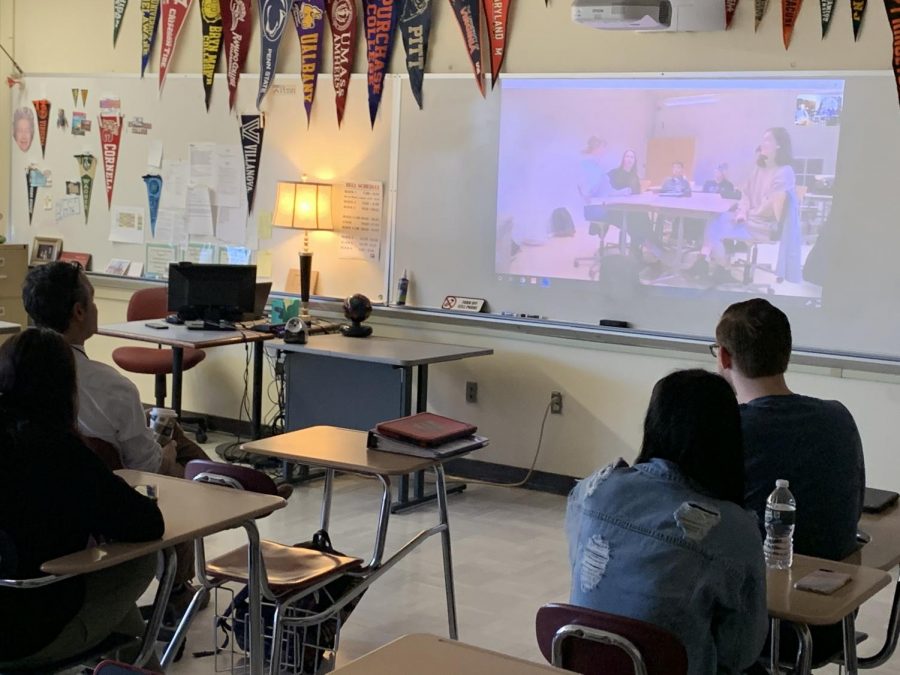Stereotypes, Culture, and Conversation: Hills English Class Skypes Denmark Students
March 13, 2020
Mr. Perkins’ senior English class skyped a class of students from Denmark on March 5th, where they discussed the many differences between American and Danish education, cultural norms, and stereotypes.
The group of Danish students, whose ages ranged from 15 to 16, and their teacher Miriam West live in a small village named Daugård along the east coast of Denmark.
Some of the immediate cultural differences noticed between the two groups were that the class sizes were significantly smaller in Denmark. While a typical English class at Wayne Hills consists of roughly 20 to 30 students, the one Perkins’ class skyped only six. Teachers also tend to go by their first name in Denmark, where the education culture is less formal than in America.
The classes began by discussing stereotypes Danes and Americans have for each other. While the Hills students could not think of any glaring stereotypes for Danes, some of West’s students pointed out interesting facts about American society.
“The cheerleading culture seems to be a big part of American culture,” one Danish student commented.
“And it seems like everyone goes to McDonald’s,” another said.
The two groups talked about the perception people tend to have about both countries, discussing some of the perceived stereotypes and the extent of their validity. They also compared the different school systems in Denmark and America, focusing on athletics and extracurricular activities.
Whereas football is a significant sport in American culture that many students watch, the students from Denmark said that in their country, football is not very competitive and only played for fun. Instead, the group said that they participate in soccer, volleyball, handball, and gymnastics.
Considering the approaching prom for seniors, many of the Hills students were surprised to learn that Danish students attend an annual gala instead—an event the whole school participates in.
“You don’t have dates,” one of the Danish students commented, “You go with your friends and you dance a fancy classical dance that is learned from a hundred years.”
The long-standing tradition of the gala highlights a key difference in Danish and American cultures.
However, with further discussion, both groups discovered that perhaps the biggest cultural difference was how Americans and Danes regard teenage drinking.
In America, there is a strict drinking as of 21, and any form of underage drinking is both illegal and taboo. In Denmark, however, there is no drinking age and kids are allowed to purchase and consume alcohol without many obstacles.
After being asked if there was excessive drinking on weekends, one of the Danish students responded, “Yes, but it’s normal. You can be 14 or 15 and have your parents buy you alcohol and drive you to parties and pick you up after.”
They explained that in Denmark, it’s not uncommon for people to go to parties and drink. While many may assume that the normal occurrence of teenage drinking would result in higher drunk driving accidents and alcohol poisoning cases, the Danish students said that it is actually the opposite.
“We have a very low amount of deaths from alcohol poisoning,” one of them said, “Also, people learn to drink before they are allowed to drive. By the time people are 21, they are pretty much over it. Instead of drinking every weekend, people drink only like once every three months.”
Through exploring and discussing cultural differences, both groups were able to learn more about the other country’s societal culture and schools.
Perkins, who went on sabbatical in France two years prior, has had plenty of experiences and insight regarding cultures around the world. We asked him for his opinion on the importance of having such conversations in today’s society.
“I think that it fosters empathy,” Perkins said, “It makes students geographically and culturally aware. I think it helps to break down barriers. It also helps to break down stereotypes and sort of break down those preconceived notions and ideas about what another place may be like. To travel is sort of to a cure for prejudice and a cure for closemindedness.”
Jada Daniels, a Wayne Hills senior who participated in the Skype call, also commented, “I think the most surprising thing was that there’s no drinking age in Denmark because every country has one even if it’s not 21 and Denmark doesn’t have one at all. And, we couldn’t decide whether that’s better or worse.”
Learning to connect, talk, and emphasize with others experiencing life completely different than one’s own is significant to staying open-minded and growing more perceptive as individuals. In a society where stereotypes, hate speech, and xenophobia are inevitable, it is only more crucial to work to understand differences in culture and try to see the world from someone else’s lens.







